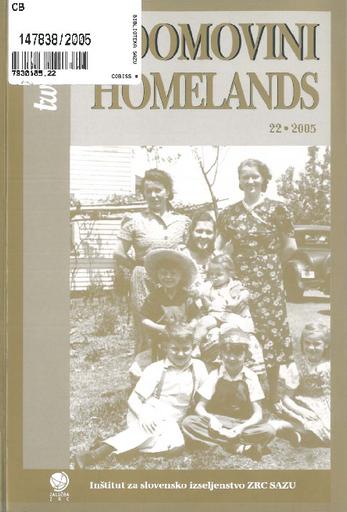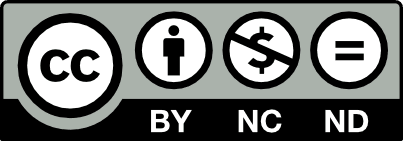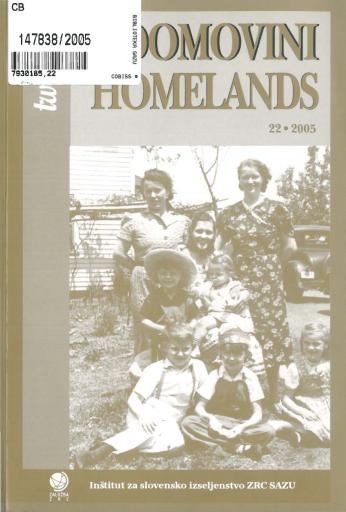
/
Periodicals
/
Dve domovini / Two Homelands
Slovenian migration streams to Germany and the changing of role of Slovenian language

Author(s):Saška Štumberger
Co-author(s):Marjan Drnovšek (ur.)
Leto:2005
Publisher(s):Inštitut za slovensko izseljenstvo in migracije ZRC SAZU, Ljubljana
Source(s):Dve domovini, 2005, št. 22
Language(s):slovenščina
Type(s) of material:text
Keywords:Slovenci v Nemčiji, zdomci, izseljenci, migracije, dvojezičnost, slovenščina, Slovenians in Germany, migrant workers, emigrants, migrations, bilingualism, Slovenian language
Rights:

This work by Saška Štumberger is licensed under Creative Commons Attribution-NonCommercial-NoDerivs 4.0 International
Files (1)

Name:Dve_domovini_22.pdf
Size:59.15MB
Format:application/pdf
Permanent link:https://hdl.handle.net/11686/file5092
Description
Explained in the article are terms denoting Slovenians in Germany that are linked with the manner of crossing the border (legal— illegal), causes for migrations (economic — political), and with duration of staying (temporary — permanent). The historical survey begins with the 19th century while the centre of the research is the time after World War II. The description of migration streams and life in Germany is based on articles published in Slovenian magazines and newspapers and on interviews with Slovenians in Germany. Particularly precisely described are events, researches and articles in the media that have influenced in Slovenia (Yugoslavia) and in Germany on the changing of the role of Slovenian language and attitude towards bilingualism.
Metadata (12)
- identifierhttps://hdl.handle.net/11686/15233
- title
- Slovenski selitveni tokovi v Nemčijo in spreminjanje vloge slovenščine
- Slovenian migration streams to Germany and the changing of role of Slovenian language
- creator
- Saška Štumberger
- contributor
- Marjan Drnovšek (ur.)
- subject
- Slovenci v Nemčiji
- zdomci
- izseljenci
- migracije
- dvojezičnost
- slovenščina
- Slovenians in Germany
- migrant workers
- emigrants
- migrations
- bilingualism
- Slovenian language
- description
- V članku so pojasnjena poimenovanja za Slovence v Nemčiji, ki so povezana z načinom prestopa meje (legalen nelegalen), z vzroki selitev (ekonomski — politični) in s trajanjem bivanja (začasno - stalno). Začetek zgodovinskega pregleda je v 19. stoletju, težišče raziskave pa je čas po drugi svetovni vojni. Opis selitvenih tokov in življenja v Nemčiji temelji na člankih, ki so izšli v slovenskih revijah in časopisih, ter na pogovorih s Slovenci v Nemčiji, Posebno natančno so opisani dogodki, raziskave in članki v medijih, ki so v Sloveniji (Jugoslaviji) in Nemčiji vplivali na spreminjanje vloge slovenščine ter odnos do dvojezičnosti.
- Explained in the article are terms denoting Slovenians in Germany that are linked with the manner of crossing the border (legal— illegal), causes for migrations (economic — political), and with duration of staying (temporary — permanent). The historical survey begins with the 19th century while the centre of the research is the time after World War II. The description of migration streams and life in Germany is based on articles published in Slovenian magazines and newspapers and on interviews with Slovenians in Germany. Particularly precisely described are events, researches and articles in the media that have influenced in Slovenia (Yugoslavia) and in Germany on the changing of the role of Slovenian language and attitude towards bilingualism.
- publisher
- Inštitut za slovensko izseljenstvo in migracije ZRC SAZU
- date
- 2005
- type
- besedilo
- language
- Slovenščina
- isPartOf
- rights
- license: ccByNcNd
Citirano v (1)
| Tipologija | Avtor(ji) | Naslov | Kraj | Založba | Leto |
|---|---|---|---|---|---|
| 1.01 Izvirni znanstveni članek | Piškurić, Jelka | Na "začasnem" delu v Nemčiji : odnos Jugoslavije do ekonomskih izseljencev | Ljubljana | Inštitut za novejšo zgodovino | 2021 |